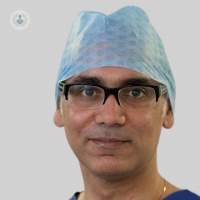Common bladder problems and their treatments
Written in association with:Mr Sarb Sandhu is a leading consultant urologist based in London. In his latest article, Mr Sandhu offers his expert insight into the causes and treatments for a wide range of bladder problems.

What causes bladder problems?
Bladder problems can have numerous different causes. In some cases, they are caused by a serious malignant condition, where you could suffer from blood in the urine or other serious symptoms, or they could be benign conditions where you have to pass urine frequently or can’t pass urine at all. All of these conditions can cause discomfort, and we can help relieve these uncomfortable symptoms with different treatments.
What are the signs of bladder problems?
One of the first signs of a problem with the bladder is a change in urine colour. Passing urine more frequently or losing control of your urine are also classic signs of bladder problems.

Do symptoms of bladder problems differ between men and women?
Yes, the symptoms can differ between the sexes. Men can have a special type of bladder problem related to the prostate. This can cause infrequent urination and the inability to fully empty their bladder. They could also experience an urgency to pass urine due to a prostate condition.
The treatment for this is different for men, simply because women don’t have prostates.
Women can also suffer from problems that men don’t often experience, usually regarding incontinence.
How is the underlying cause of bladder problems diagnosed?
There are some simple tests that can be done. The first thing that has to be done is rule out any malignant causes, so blood in the urine and other tell-tale signs will prompt a scan, most commonly a flexible cystoscopy.
The other causes of bladder problems will be diagnosed by looking at the symptoms and investigating them appropriately.

Can diet improve bladder problems?
If someone is overweight, this can have a negative impact on symptoms. Getting down to a normal BMI can help.
Some caffeinated products make us want to pass urine more frequently, such as coffee and fizzy drinks. Some patients will complain of having to pass urine too much, and then tell you they have to drink two and a half litres of water a day. I tell them to remember that there isn’t a well inside our bodies, and what we drink has to come out.
There are some bladder problems related to diseases such as diabetes or heart failure, and the bladder problems are just manifestations of these diseases.
How do you fix a bladder problem?
The best way to fix a bladder problem is to treat the cause. The different treatments depend on the underlying problem. The first step is diagnosis, and then the problem can be treated.
Mr Sarb Sandhu is a urologist with extensive experience treating bladder cancer, bladder problems and prostate cancer. If you are concerned about any bladder problem, you can book a consultation with Mr Sandhu today via his Top Doctors profile.


